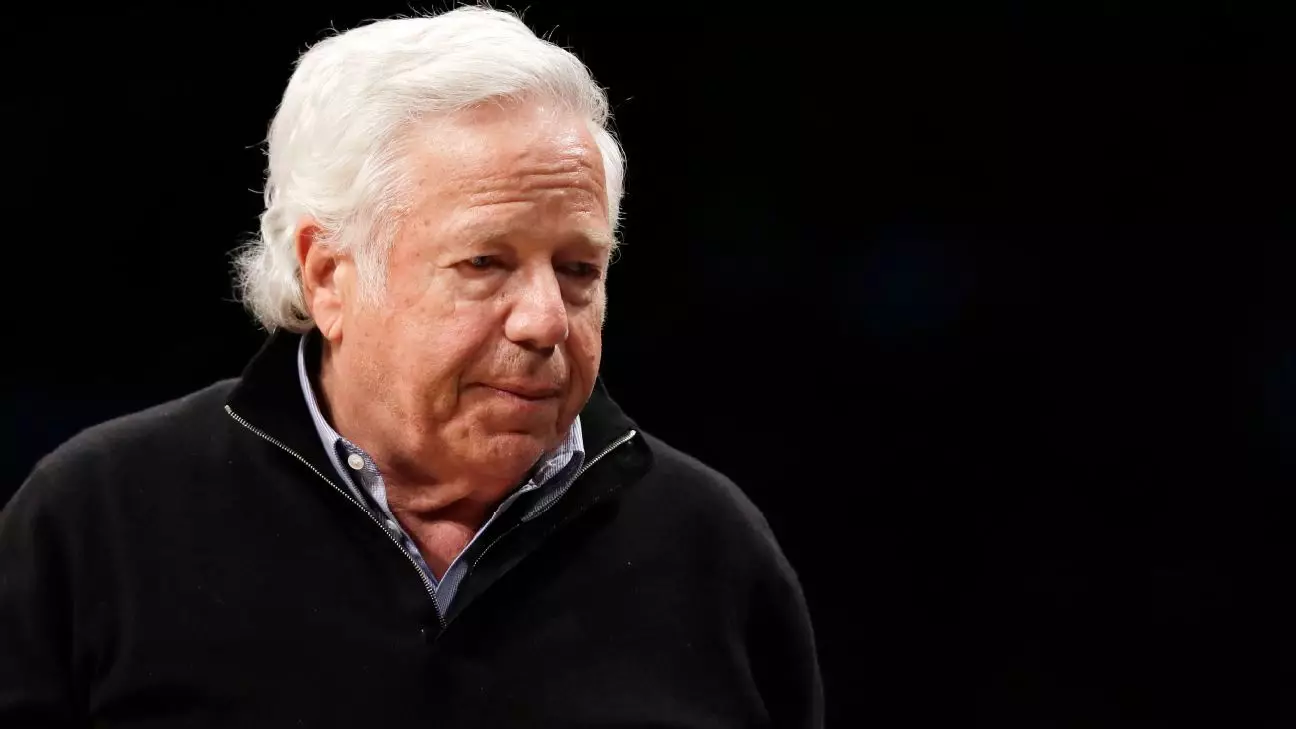The Pro Football Hall of Fame continues to evoke mixed emotions as Robert Kraft, the venerable owner of the New England Patriots, finds himself passed over once again. Despite the credibility of being a six-time Super Bowl champion and a figure synonymous with the NFL’s success, Kraft remains on the outside looking in. According to sources, the Hall’s contributor committee recently opted to advance the name of Ralph Hay, a lesser-known co-founder of the NFL, for consideration instead, which further complicates the narrative surrounding induction criteria.
This marks the 13th occasion Kraft has been nominated for Hall consideration, and his repeated omission raises questions about the evaluation processes used by the selection committees. The latest decision, made on November 12, has cast a shadow on Kraft’s illustrious career, leaving supporters disheartened. After all, it’s not just about accolades or legacy; it often boils down to the prevailing mood within those who hold the keys to the hall—a mood that, for the time being, appears unfavorable for Kraft.
Ralph Hay, the choice of the contributor committee, has a rich historical significance in the NFL. He was a pivotal figure in organizing the first meeting of what would eventually transform into the NFL in 1920. Most historians note that without Hay’s efforts, professional football might not have developed into the juggernaut it is today. It’s perplexing then, that a person of such transformative impact has only just now surfaced as a finalist, whereas Kraft has been placed under relentless scrutiny year after year.
While Hay may have played an instrumental role at the inception of professional football, his brief tenure with the Canton Bulldogs leaves room for skepticism regarding his contributions compared to those of Kraft. Many see the choice as emblematic of an old guard that appreciates the historical over the contemporary, underscoring a perceived disconnect between legacy and current contributions. A sentiment echoed by critics, who argue that Hay’s lack of alignment with players’ rights casts shadows over the reverence he’s received. Nonetheless, the mere act of recognizing Hay might be an attempt to rekindle an appreciation for the game’s roots.
The opaque nature of the Hall’s selection process often stirs controversy and debate. Critics consistently point to the lack of clarity in how candidates are evaluated. Kraft’s supporters, inclusive of Hall of Famers like Bill Polian, argue vehemently that all criteria for consideration should be indicative of a candidate’s achievements as opposed to subjective historical significance. They contend Kraft is deserving of a shrine in Canton given his ownership that catalyzed New England into a powerhouse and positively impacted the overall landscape of NFL ownership.
An anecdote shared by supporters suggests that despite Kraft’s longstanding advocacy for his place in history, efforts have often felt like an uphill battle. The recent years have seen other owners successfully gain induction, prompting questions about Kraft’s comparative value. Interesting to note is the apparent shift in strategy over recent years; this year, Kraft’s spokesperson Stacey James reportedly pulled back from extensive lobbying efforts. So, does this mark a stagnation in support, or merely a strategic recalibration?
With a non-existent bronze bust in Canton—a stark contrast to his six Super Bowl rings—Kraft’s illustrious career seems publicly overlooked by the Hall. Acquiring the Patriots in a calamitous financial period for the team in 1994, he transformed it into a symphony of success that harmonized both financial and athletic achievement. This achievement saw the hiring of Bill Belichick and culminated in an unparalleled Super Bowl decade from 2001 to 2018.
The juxtaposition between Kraft and others being inducted is stark. Former owners like Eddie J. DeBartolo and Jerry Jones have been recognized, highlighting not just their competitive success but also their broader cultural and business impacts on the NFL. This raises apprehensions about whether Kraft’s contributions—seen as foundational in transforming a struggling franchise into a dynasty—are somehow being undermined in favor of historical anecdotes rather than contemporary success.
As the Hall of Fame navigates the convoluted waters of legacy and modernity, the desire for transparency and consistent criteria becomes apparent among fans and players alike. For Kraft, this ongoing saga begs the question: How many accolades must one receive before being acknowledged by a body that ostensibly celebrates greatness in football? While the narrative surrounding Ralph Hay may emphasize foundational history, the extensive accolades and accomplishments of Robert Kraft warrant serious consideration.
Ultimately, the Hall stands at a crossroads, forced to reckon with how it weighs historical importance against contemporary achievement. As discussions unfold and selections loom, one cannot help but reflect on the complexities of sports meritocracy, and the quest for fairness in acknowledgment in the annals of NFL history.


Leave a Reply